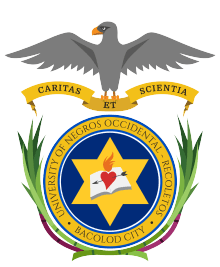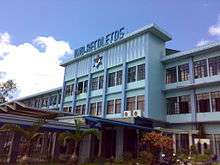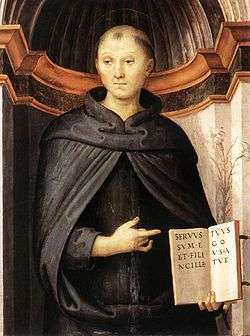University of Negros Occidental – Recoletos
| Pamantasan ng Kanlurang Negros – Rekoletos | |
 Seal of the University of Negros Occidental - Recoletos | |
Former names |
|
|---|---|
| Motto | Caritas et Scientia |
Motto in English | Love and Knowledge |
| Type | Private |
| Established | 1941 |
| Affiliation | Roman Catholic, Recoletos |
| President | Rev. Fr. Eduardo S. Celiz, Jr., OAR[1] |
Administrative staff | Approximately 500 |
| Location | Bacolod, Philippines |
| Campus | 15 hectares, Urban |
| Colors | Blue and Gold |
| Athletics | NOPSSCEA |
| Nickname | UNO-Rians, Rams |
| Mascot | Golden Ram |
| Website | http://www.uno-r.edu.ph |
The University of Negros Occidental – Recoletos (UNO-Recoletos, Filipino: Pamantasan ng Kanlurang Negros – Rekoletos, colloquially UNO-R), is a private, Roman Catholic university founded on 1941 in Bacolod, Negros Occidental, Philippines and administered by the Order of Augustinian Recollects.
The University was granted "autonomous status" by the Commission on Higher Education (CHED) for five years[2] while its College of Arts and Sciences was granted Level III accreditation by the Philippine Accrediting Association of Schools, Colleges and Universities (PAASCU).[3] CHED also granted the university’s College of Engineering and College of Information Technology the distinction as Centers of Development and Excellence in their Electrical Engineering and Information Technology courses respectively.[4] The university was also granted with Category A(t) by the Institutional Quality Assurance through Monitoring and Evaluation (IQuAME).
History

The University of Negros Occidental – Recoletos was founded in 1941 in Talisay, Negros Occidental by Dr. Antonio A. Lizares and Dr. Francisco Kilayko. Then known as Occidental Negros Institute, the school offered first and second years of high school education. Upon the outbreak of World War II in the Philippines in December of that same year, the institute closed temporarily.[5]
Occidental Negros Institute was re-established in Bacolod in 1946, this time offering elementary, high school and three tertiary degree programs. The campus transferred from Locsin street (formerly Smith Street) to Lupit Subdivision in Lizares Avenue, its present site, in 1950. Dr. Antonio Lizares served as the school's first President with Dr. Francisco Kilayko as the School Director.[6]
On May 15, 1957, ONI was elevated to university status by the Acting Secretary of Education, Martin V. Aguilar, Jr. ONI became the University of Negros Occidental, the first university in the province. Five years later, on May 25, 1962, UNO was acquired by the Augustinian Recollect friars. UNO became the University of Negros Occidental-Recoletos with Fr. Federico Terradillos, OAR, as the first acting Rector.[7]
Philosophy
| “ | An Augustinian Recollect Center of Learning which makes knowledge (Scientia) a structure of wisdom that leads one to the exercise of love (Caritas). | ” |
Vision Statement
| “ | A Catholic University committed to the integral formation of the human person with passion for excellence and service to the Church and society. | ” |
Mission Statement
| “ | An Augustinian Recollect University that educates the mind and the heart by providing the climate, the structure, and the means to develop the vocation, knowledge, skills, talents, and attitude of the community as permeated by the Gospel values for the service of humanity, love and praise to one God. | ” |
Goals
The University of Negros Occidental-Recoletos translates its mission statement into the following four domains of schooling:
- 1.) Academic: Continuing education with religion as the core to qualified persons with preferential option for the poor from elementary to the graduate levels;
- 2.) Non-Academic: Opening of opportunities for the development of skills and talents in the areas of sports and cultural endeavors;
- 3.) Community Extension: Complementation of the study programs with inter-disciplinary outreach projects that will enable the academic community to be involved in the promotion of the total development of man;
- 4.) Research: Enrichment of existing academic programs and broadening of knowledge through functional, ethical researches for the authentic good individuals and the society.
Objectives
At the end of the formation, the students are expected to be:
- Spiritually sound individuals who are CHRIST-centered and MARIAN- inspired;
- Intellectually cultured individuals who are able to rationally and eloquently communicate their ideas and appreciate the arts as reflections of the infinite beauty of God;
- Morally healthy individuals who can weigh values with great sense of accountability;
- Physically healthy individuals who give due respect to the body, keeping it fit as a temple of the HOLY SPIRIT;
- Culturally conscious individuals who value heritage earned by past generations, enriching it by promoting desirable traditions and rendering authentic service to the Church and the country for the common good;
- Socially concerned individuals who are sensitive and responsive to the needs of the marginalized sector of the community and the society;
- Technically proficient individuals who are superior in useful skills in the practice of professions; and
- Scholarly leaders of science who extend the frontiers of knowledge through experimentation and verification bringing about a deeper evaluation of problems that will make them see profoundly the synthesis of faith, reason, culture and life.
Core Values
- S.I.M.P.L.E
- Service & Community Life
- Interiority
- Marian & Moral Integrity
- Peace and Justice
- Love
- (Passion for) Excellence
Academics
UNO-R offers pre-school, elementary, secondary (junior & senior high), undergraduate and graduate level programs. It has seven academic colleges namely:
- College of Arts and Sciences
- College of Business and Accountancy
- College of Criminal Justice Education
- College of Education
- College of Engineering
- College of Information Technology
- College of Nursing and Allied Health Sciences
UNO-R also houses a Technical Education Department (6-month Health Caregiver Course), a School of Law and a graduate school named the Recoletos de Bacolod Graduate School.
Patron Saint

The university's patron saint is Nicholas of Tolentino. Saint Nicholas of Tolentino, known as the Patron of Holy Souls, was born at Sant' Angelo, near Fermo, in Italy in the March of Ancona, around 1246. His parents, Compagnonus de Guarutti and Amata de Guidiani, were originally unable to have a child, but after praying at a shrine of St. Nicholas of Myra, Amata became pregnant, and they named their son after the saint.
The university's student publication, the Tolentine Star, pays homage to the saint.
OAR sister schools
- University of San Jose–Recoletos (Cebu City)
- San Sebastian College–Recoletos de Manila
- San Sebastian College–Recoletos de Canlubang (Calamba, Laguna)
- San Sebastian College–Recoletos de Cavite
- Colegio de Santo Tomas – Recoletos (San Carlos City, Negros Occidental)
- San Pedro Academy–Recoletos (Caidiocan, Valencia, Negros Oriental)
- San Pedro Academy–Recoletos (Poblacion, Valencia, Negros Oriental)
- Colegio San Nicolas de Tolentino–Recoletos (formerly UNO-R High School Talisay Branch) (Talisay City, Negros Occidental)
Seminary and Formation Houses
- Santo Tomas de Villanueva Recoletos Formation House (High School) (San Carlos City, Negros Occidental)
- Casiciaco Recoleos Seminary (formerly Seminario Mayor - Recoletos de Baguio) (Philosophy) (Baguio City)
- Recoletos Formation Center (Theology) (Mira-Nila Homes, Quezon City)
See also
- Augustinians
- Augustinian Recollects
- Bridgittines
- List of tertiary schools in Bacolod City
- Order of the Canons Regular of Premontre
- Society of Saint Augustine
Gallery
 Entrance to UNO-Recoletos
Entrance to UNO-Recoletos Football field
Football field Covered catwalk
Covered catwalk Main lobby
Main lobby College of Engineering building
College of Engineering building Grade School department hallway
Grade School department hallway
 College of Business and Accountancy building
College of Business and Accountancy building UNO-Recoletos canteen
UNO-Recoletos canteen The UNO-Recoletos insignia
The UNO-Recoletos insignia Inside UNO-Recoletos lobby
Inside UNO-Recoletos lobby College of Nursing and Allied Health Sciences department office
College of Nursing and Allied Health Sciences department office High School department hallway
High School department hallway
References
- ↑ UNO-R. "FR. CELIZ IS THE NEW PRESIDENT". University of Negros Occidental - Recoletos website. UNO-Recoletos. Retrieved 15 June 2015.
- ↑ "UNO – R Granted Autonomous Status by CHED". 2 April 2009. Retrieved 11 April 2013.
- ↑ UNO-R. "College of Arts and Sciences". University of Negros Occidental - Recoletos website. University of Negros Occidental - Recoletos website. Retrieved 11 April 2013.
- ↑ CHED. "Centers of Excellence/Development (COE/COD)". CHED website. CHED. Retrieved 11 April 2013.
- ↑ Faraon, Lopez. "A Recoleto Legacy". UNO - Recoletos website. UNO - Recoletos. Retrieved 11 April 2013.
- ↑ Faraon, Lopez. "A Recoleto Legacy". UNO - Recoletos website. UNO - Recoletos. Retrieved 11 April 2013.
- ↑ Faraon, Lopez. "A Recoleto Legacy". UNO - Recoletos website. UNO - Recoletos. Retrieved 11 April 2013.
External links
- Official website
- University of Negros Occidental – Recoletos on Facebook
- Order of Augustinian Recollects - Province of St. Ezekiel Moreno Website
- International Order of St. Augustine
- Text of the Rule of St. Augustine
- The Society of Saint Augustine (S.S.A.) Societas Sancti Augustini